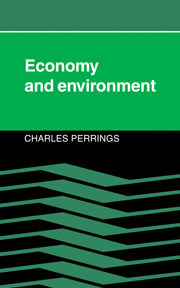 Economy and Environment
Economy and Environment Book contents
- Frontmatter
- Contents
- Preface
- Notation Guide
- 1 Introduction
- Part I The physical economy-environment system
- Part II The economic system
- Part III Environmental strategies in an evolutionary economy-environment system
- 8 Time, uncertainty, and external effects
- 9 The market solution
- 10 The stationary state
- 11 Conclusions
- References
- Index
9 - The market solution
Published online by Cambridge University Press: 20 March 2010
- Frontmatter
- Contents
- Preface
- Notation Guide
- 1 Introduction
- Part I The physical economy-environment system
- Part II The economic system
- Part III Environmental strategies in an evolutionary economy-environment system
- 8 Time, uncertainty, and external effects
- 9 The market solution
- 10 The stationary state
- 11 Conclusions
- References
- Index
Summary
Resource depletion and pollution
We come now to the point where we can assess what has been called the market solution to the twin environmental problems generated by the process of economic growth: the depletion of environmental resources and the pollution of environmental processes. This returns us to the questions raised in Chapter 4 in connection with the Club of Rome debate of the early 1970s. How are we to assess the theory of optimal depletion and pollution in an evolutionary economy-environment system subject to uncertainty? What are we to make of the reliance on general equilibrium models to yield efficient solutions to the problems of the despoliation of a far-from-equilibrium real world? To begin, let us rehearse the purely physical reasons for the significance of depletion and pollution in an economy-environment system.
It has already been remarked that the depletion of environmental resources is synonymous with exactions on the environment, where an exaction is defined as the forcible, uncompensated, acquisition of the outputs of one process by the agent(s) of another process. Whether the rate of exactions on environmental resources at any particular moment in the history of the system is greater than or less than the rate of regeneration of those same resources determines whether the depletion problem is popularly considered to be an exhaustible or renewable resource problem. Strictly, we have defined environmental resources subject to exaction to be renewable under a given technology if their maximum potential own-rate of growth is greater than or equal to the maximum potential own-rate of growth of the economy, and to be exhaustible if their maximum potential own-rate of growth is less than that of the economy.
- Type
- Chapter
- Information
- Economy and EnvironmentA Theoretical Essay on the Interdependence of Economic and Environmental Systems, pp. 125 - 140Publisher: Cambridge University PressPrint publication year: 1987
